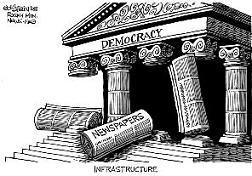Secrecy Regarding Uganda’s Strategic Oil Reserves
The Collapse of Democracy?

Uganda’s Chief Magistrate’s court dismissed a landmark case on Wednesday that had been filed by two Ugandan journalists, Angelo Izama and Charles Mwanguhya Mpagi. The file was introduced by the journalists as an attempt to use Uganda’s Access to Information Act to force the Ugandan government to release the details of five oil Production Sharing Agreements that it has signed with oil companies. The government and the oil companies has resisted pressure to divulge even the smallest details to the public — both attempting to deflect criticism by citing the other’s insistence in maintaining secrecy over the deals.
Oil explorers have long been skeptical of Uganda’s potential for holding large oil deposits but in the last few years oil exploration has proved wildly successful. The estimates now lie upwards of 6 billion barrels of oil — if on the higher end, Uganda would surpass Sudan for the fifth largest oil reserves in Africa.
Observers are not optimistic at the implications of Uganda’s oil finds. Although it would inject billions of dollars annually into Uganda’s economy, widespread corruption (Uganda was ranked126th out of 179 countries in Transparency International’s Corruption Perception Index) increases the risk that the country could slip into the feared “resource curse“. While the government and the oil companies paint a rosy picture for the public, analysts are less sanguine. As Taimour Lay writes in The Guardian, the components for a bad situation are all there:
The ingredients for the so-called “resource curse” are all in place: contract secrecy, government corruption, commercial disinformation campaigns, with environmental protections ignored, and a simmering border dispute with the Democratic Republic of the Congo frozen rather than resolved.
Although the Chief Magistrate’s reasoning behind the dismissal of the case was less than convincing (he cited “national security”), it certainly highlighted Uganda’s press freedom, right? That is, until Angelo Izama was slapped with a charge of libel and driven to jail on the very next day. The complaint? A December 2009 article in which Izama suggested parallels between President Yoweri Museveni and Philippine dictator Ferdinand Marcos.
Although this is not a new tactic — typically used by the Ugandan government to intimidate journalists — such cases have certainly picked up in the last year. In a country where press freedom is one of the most important aspects of its “partly free” rating by Freedom House, this is a disturbing trend.
The Committee to Protect Journalists reports on the Ugandan government’s widespread use of defamation statutes to coerce its critics:
“If anything proves that a government is authoritarian, it’s jailing journalists who raise questions about the government,” said CPJ Africa Program Coordinator Tom Rhodes. “It’s regrettable that the magistrate charged Angelo Izama and Henry Ochieng with criminal libel. It’s time for Uganda to join the ranks of democracies by eliminating criminal defamation statutes.”
…
Izama and Ochieng are among several Monitor journalists facing criminal charges in connection with their coverage, according to CPJ research. Sedition charges also hang over radio journalists Robert Kalundi Sserumaga and Betty Nambooze, while a government ban remains on popular debate programs and Central Broadcasting Services, the station of the traditional kingdom of the Baganda, Uganda’s largest ethnic group, since last September.
Election fever for the 2011 presidential elections starts in the next few months and President Yoweri Museveni will be running for his fourth term. A potential resource curse and press intimidation are not the best of omens for a free and fair election. Ugandan journalists will play an essential role in pushing for transparency — and I have a hunch they won’t be cowed.

